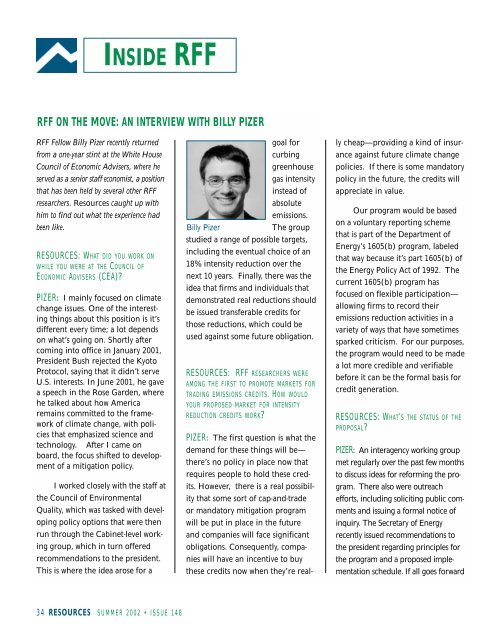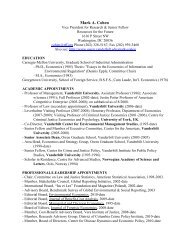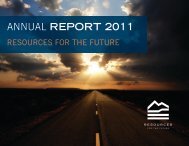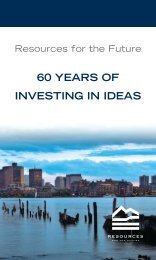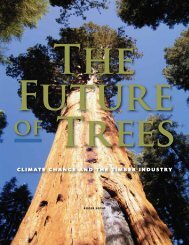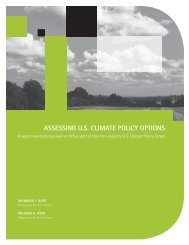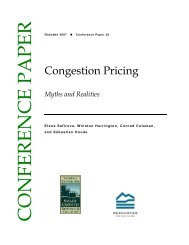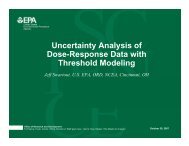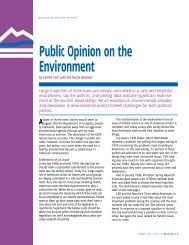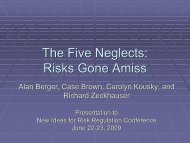Resources: Summer 2002; Issue 148 - Resources for the Future
Resources: Summer 2002; Issue 148 - Resources for the Future
Resources: Summer 2002; Issue 148 - Resources for the Future
Create successful ePaper yourself
Turn your PDF publications into a flip-book with our unique Google optimized e-Paper software.
INSIDE RFF<br />
RFF ON THE MOVE: AN INTERVIEW WITH BILLY PIZER<br />
RFF Fellow Billy Pizer recently returned<br />
from a one-year stint at <strong>the</strong> White House<br />
Council of Economic Advisers, where he<br />
served as a senior staff economist, a position<br />
that has been held by several o<strong>the</strong>r RFF<br />
researchers. <strong>Resources</strong> caught up with<br />
him to find out what <strong>the</strong> experience had<br />
been like.<br />
RESOURCES: WHAT DID YOU WORK ON<br />
WHILEYOUWEREATTHECOUNCIL OF<br />
ECONOMIC ADVISERS (CEA)?<br />
PIZER: I mainly focused on climate<br />
change issues. One of <strong>the</strong> interesting<br />
things about this position is it’s<br />
different every time; a lot depends<br />
on what’s going on. Shortly after<br />
coming into office in January 2001,<br />
President Bush rejected <strong>the</strong> Kyoto<br />
Protocol, saying that it didn’t serve<br />
U.S. interests. In June 2001, he gave<br />
a speech in <strong>the</strong> Rose Garden, where<br />
he talked about how America<br />
remains committed to <strong>the</strong> framework<br />
of climate change, with policies<br />
that emphasized science and<br />
technology. After I came on<br />
board, <strong>the</strong> focus shifted to development<br />
of a mitigation policy.<br />
I worked closely with <strong>the</strong> staff at<br />
<strong>the</strong> Council of Environmental<br />
Quality, which was tasked with developing<br />
policy options that were <strong>the</strong>n<br />
run through <strong>the</strong> Cabinet-level working<br />
group, which in turn offered<br />
recommendations to <strong>the</strong> president.<br />
This is where <strong>the</strong> idea arose <strong>for</strong> a<br />
goal <strong>for</strong><br />
curbing<br />
greenhouse<br />
gas intensity<br />
instead of<br />
absolute<br />
emissions.<br />
Billy Pizer<br />
The group<br />
studied a range of possible targets,<br />
including <strong>the</strong> eventual choice of an<br />
18% intensity reduction over <strong>the</strong><br />
next 10 years. Finally, <strong>the</strong>re was <strong>the</strong><br />
idea that firms and individuals that<br />
demonstrated real reductions should<br />
be issued transferable credits <strong>for</strong><br />
those reductions, which could be<br />
used against some future obligation.<br />
RESOURCES: RFF RESEARCHERS WERE<br />
AMONG THE FIRST TO PROMOTE MARKETS FOR<br />
TRADING EMISSIONS CREDITS. HOW WOULD<br />
YOUR PROPOSED MARKET FOR INTENSITY<br />
REDUCTION CREDITS WORK?<br />
PIZER: The first question is what <strong>the</strong><br />
demand <strong>for</strong> <strong>the</strong>se things will be—<br />
<strong>the</strong>re’s no policy in place now that<br />
requires people to hold <strong>the</strong>se credits.<br />
However, <strong>the</strong>re is a real possibility<br />
that some sort of cap-and-trade<br />
or mandatory mitigation program<br />
will be put in place in <strong>the</strong> future<br />
and companies will face significant<br />
obligations. Consequently, companies<br />
will have an incentive to buy<br />
<strong>the</strong>se credits now when <strong>the</strong>y’re really<br />
cheap—providing a kind of insurance<br />
against future climate change<br />
policies. If <strong>the</strong>re is some mandatory<br />
policy in <strong>the</strong> future, <strong>the</strong> credits will<br />
appreciate in value.<br />
Our program would be based<br />
on a voluntary reporting scheme<br />
that is part of <strong>the</strong> Department of<br />
Energy’s 1605(b) program, labeled<br />
that way because it’s part 1605(b) of<br />
<strong>the</strong> Energy Policy Act of 1992. The<br />
current 1605(b) program has<br />
focused on flexible participation—<br />
allowing firms to record <strong>the</strong>ir<br />
emissions reduction activities in a<br />
variety of ways that have sometimes<br />
sparked criticism. For our purposes,<br />
<strong>the</strong> program would need to be made<br />
a lot more credible and verifiable<br />
be<strong>for</strong>e it can be <strong>the</strong> <strong>for</strong>mal basis <strong>for</strong><br />
credit generation.<br />
RESOURCES: WHAT’S THE STATUS OF THE<br />
PROPOSAL?<br />
PIZER: An interagency working group<br />
met regularly over <strong>the</strong> past few months<br />
to discuss ideas <strong>for</strong> re<strong>for</strong>ming <strong>the</strong> program.<br />
There also were outreach<br />
ef<strong>for</strong>ts, including soliciting public comments<br />
and issuing a <strong>for</strong>mal notice of<br />
inquiry. The Secretary of Energy<br />
recently issued recommendations to<br />
<strong>the</strong> president regarding principles <strong>for</strong><br />
<strong>the</strong> program and a proposed implementation<br />
schedule. If all goes <strong>for</strong>ward<br />
34 RESOURCES SUMMER <strong>2002</strong> • ISSUE <strong>148</strong>


